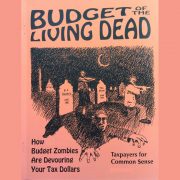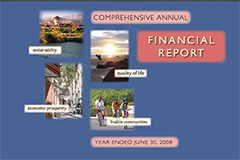Economic Illiteracy, Indifference And Denial Plague Ventura Finances

IF SOMETHING CANNOT GO ON FOREVER IT WILL STOP
—Herb Stein, Economics Professor
DETROIT – A HAUNTING SPECTRE
[The Consequences of Ignoring Economic Reality]
Most people are now well aware of the economic news. The City of Detroit filed bankruptcy under a cloud of $18 billion in debt. Crippling problems with corruption, unfunded benefits and pension liabilities, nepotism, and cozy political relationships between public unions and elected officials served to bring about their demise.

Detroit’s bad economic policy led to bankruptcy
These problems were enormous, but it was allowed to happen because of an attitude of denial. Elected officials and citizens continued year after year to look the other way despite mounting evidence that their City was rushing towards bankruptcy – the debt continued to mount and the income continued to dwindle. The official cause of death – no money.
How would you feel if you learned that someone you know was spending more than he was earning and having to dip into savings to keep going? You might think at first blush that it’s because of the Great Recession. But, what if you then learned that in the 4 years since the Great Recession the same person had not changed his spending habits as well as not earning enough income to support their profligate spending? To explain this as being due to anything other than bad judgment, or reckless fiscal mismanagement, is to engage in the same type of denial that led the citizens of Detroit into bankruptcy.
California Cities In Bankruptcy. Will Ventura Follow?

San Bernardino went bankrupt because of bad economic practices
This news follows the similar fate of cities closer to home like Stockton, Vallejo and San Bernardino. The City Council in San Bernardino decided to file a Chapter 9 municipal bankruptcy. That city was running a $5 million deficit on a $130 million budget and did not have enough cash to pay its vendors, workers and retirees. In the last 4 years the tide has gone out and were are now finding out who was swimming naked.
So, good reader you ask – “What do the financial problems in Detroit or these other California Cities have to do with Ventura?” The answer lies in the fact that over the last 4 years City Government has used “budget gimmickry” to make it appear as if the City Council had balanced our budget each year. Solvency was the stuff of fiction for our then City Manager, Rick Cole and Mayor Bill Fulton. They are gone and we are left with economic reality – not enough money to pay our obligations, an economy that is not recovering and unfunded public pension obligations that have doubled.
CANARY IN THE COAL MINE
[Bad Economic Policy In Practice]
On June 17, 2013, our new City Manager presented a Budget for 2013-14 to the City Council for approval. The budget is not balanced. In the last 4 years revenue decreased from $94.1 million to $82.4. The Council was presented with the following historical and projected income and expense comparisons (numbers in millions of dollars):
| Fiscal Year | Income
(millions) |
Expenses
(millions) |
Shortfall/Gap
(millions) |
| 2008-09 | $94.1 | $94.1 | 0 |
| 2009-10 | $85.1 | $96.5 | $11.4 |
| 2010-11 | $88.1 | $80.4 | $7.7 |
| 2011-12 | $ 81.0 | $81.5 | $0.5 |
| 2012-13 | $82.4 | $84.4 | $2.0 |
| 2013-14 | $86.7
(est.) |
$88.3
(est.) |
$1.6
(est.) |
Our new City Manager outlined, in a kindly manner, the efforts that had been made in the past to try to “balance the budget”, which had not been successful:
“In the past 5 years the City of Ventura has experience a decrease in general fund revenues of $16 million dollars. During the same period, budget and service cutbacks have eliminated more than 100 positions, increased employee contributions of both medical costs and retirement costs, reduced landscape maintenance and park service levels, reduced street repairs and resurfacing, discontinued the Crime Prevention Program, and reduced the Police Department Gang Unit, eliminated the Neighborhood Traffic Calming Program, temporarily closed Fire Station 4, reduced sidewalk repair program, reduced hours at the Senior Centers…just to name a few. While these efforts were extensive, they simply have not been enough to balance our budget. This is evidenced by the continuing decline of our fund balances, which have been decreased by approximately $10 million dollars over the past 5 years.
“Utilizing fund balances, or living off your savings accounts, is not an uncommon practice for municipalities during times of economic challenge but it is only a short term solution that is undertaken with the optimistic view that economic conditions will soon change for the better.”
—Mark D. Watkins, new City Manager
Too Much Data, Not Enough Information Muddles Economic Policy
This 569 page budget provides detailed expenses of $89.5 million dollars, but it totally lacks any information on how this year’s revenue of $82.4 million dollars can be increased to meet our projected expenses of 88.3 million dollars in 2013-14. Where will that additional $7,100,000 be generated? If true we are asked to accept that our City will increase our income by 8.6% next year, more than twice the U.S. Gross Domestic Product of 2.5%. What makes our City officials believe our rate of growth will be more than twice the national average?
On the liability side the facts frightfully demonstrate that we are on a financial cliff. Not only are we facing a deficit of at least $1.6 million or more in our General Fund Budget, there are the off the books debts. First, there is the matter of the unfunded pension obligations to City employees, policemen and firemen. In 2008 those obligations totaled $48 million. In our August, 2008, edition we argued that the Council should take steps to change the pension structure because those benefits were not sustainable. Today those obligations total a minimum of $96 million upward of $350 million, depending on the assumed rate of investment from CALPERS.
“If we do not find a way to restore these funds in the next 5 years we will have serious financial difficulty.”
In spite of these looming long term commitments and with an urging that the City Council not increase the Firefighters pension entitlements to 3% at age 55, the Council did it anyway. Nobody on the City council could identity where the funds would come from to pay for this increase.
Second, there is the $12 million in reserve that we have had since 1992. Not only was the income from this reserve used by the City Council as a source of income for the General Budget over the last 20 years, but we learned in March, 2013, from our interim City Manager, Johnny Johnson that $7.5 million dollars in the Public Liability Fund, Workers’ Compensation Fund and Information Technology Fund had been moved to other areas in the budget to make it appear as if our budget was balanced. In his words, “if we do not find a way to restore these funds in the next 5 years we will have serious financial difficulty.”
POST SCRIPT
INCLUSIONARY HOUSING ORDINANCE

Inclusionary housing continues Ventura’s bad economic practices
In our last issue we reported that the City Council, on July 15, 2013, would consider a request from the Community Development Director to cancel the Ventura ordinance requiring builders and developers to donate a percentage of their development to low income people. His reasons were clear, there is no housing being built in the City of Ventura. His view was shared by the State Department of Housing and Community Development, which had concluded that such ordinances “are a constraint to the development of housing”.
The Council room was flooded with the homeless, low income folks and their children, all prepared to tell their story and urge denial of the request to cancel the ordinance. This was orchestrated by CAUSE. Their organizers were in the hallway handing out bottles of water and signs that read ‘HOMES FOR EVERYONE”. A group organizer actively moved in an out of the group with clip board in hand.
Councilman Andrews quickly presented a motion to defer a decision on the measure and for the appointment of a Blue Ribbon Committee to study the matter further. Councilman Brennan, joined by Councilman Morehouse, pointed out that when they came up with this idea for this ordinance in 2006 “we knew we were going to have to massage it because we did not know where it was going. We expected we would have to come back and look at alternatives”. The three of them voted to table the matter and appoint a special committee of “experts” to make recommendations.
“This 2006 ordinance was a half baked idea”
Councilwoman Weir painted a more candid view of this ordinance. In her words “this 2006 ordinance was a half baked idea”, and that “it was no surprise to anyone it is not working”. She also observed that a lot of those people in the audience who spoke against cancellation were homeless and would never qualify under the program anyway. Ms. Weir favored an “in-lieu” fee to help the homeless transition. Mayor Tracy and Councilman Monahan joined her in urging an “in-lieu” fee. They voted against the motion by Councilman Andrews to postpone and appoint a committee.
Deputy Mayor Heitmann provided the decisive vote to table and appoint a Blue Ribbon Committee. She seemed somewhat confused by the discussion, did not profess to have any knowledge on the subject thus voted to table the matter because there were “a lot of unanswered questions”. A perplexing comment given that the Council and been provided with a lengthy and detailed report from the Director of Community Development explaining why this ordinance had failed.
Nobody knows who will be on the Blue Ribbon Committee.
Editors’ Comments
Economic illiteracy is not recommended as a qualification for the Ventura City Council. We urge you to choose your Council Members wisely come next November.
Editors:
R. Alviani K. Corse T. Cook
J. Tingstrom R. McCord S. Doll
For more information like this, subscribe to our newsletter, Res Publica. Click here to enter your name and email address.


















